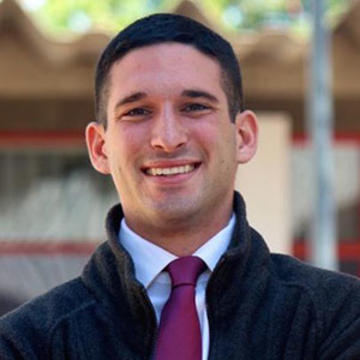Noam Angrist, founder of Young 1ove

Noam Angrist is the founder of Young 1ove, a Botswana based not-for-profit organisation, providing evidence-based sex education to young people. Noam studied Economics and Math at MIT, was a Fulbright Scholar in Botswana and is currently studying a MSc. in Evidence Based Social Intervention at the University of Oxford as a Rhodes Scholar.
As part of my studies in Economics and Math at MIT, I worked with Jonathan Gruber, analysing large data sets relevant to the Affordable Care Act, which fuelled my passion for evidence-based interventions. I also co-founded an organization called Amphibious Achievement, a mentorship programme for disadvantaged youth that combined rowing with academic tutoring. The program was designed to accept students randomly, facilitating a rigorous comparison of the impact of the program of those randomly selected to participate versus the control group randomly selected to the waitlist. We wanted to ensure we weren’t feeling good, but actually doing good – so we leveraged the tools of economics and math to understand what works in boosting social outcomes, such as student achievement and health. This obsession with dedicating my life to “what works” ultimately pushed me to start Young 1ove; there was some research done by Jameel Poverty Action Lab that showed that a one-hour “sugar daddy” awareness class reduced unwanted pregnancy by 28%, and no one was doing anything with that research. When I arrived in Botswana and saw the “sugar daddy” phenomenon first-hand, I and my co-founders Brenda Duverce, Unami Moatswi and Moitshepi Matsheng decided we didn’t want to only do research, but wanted to use research to make a real difference. We found a grant of $20,000 (through D Prize) to start Young 1ove with the goal of scale-up this evidence to reach millions and reduce pregnancy and HIV.

To me, entrepreneurship is newness and innovation, not only in the form of invention. Too often invention receives all the attention, taking 0 to 1, something that doesn’t exist to existence. I find taking 1 to millions equally innovative and entrepreneurial, if not more so. The process of achieving scale requires creating and adapting cutting-edge models and solving complex challenges. If something exists but isn’t reaching anyone, it isn’t doing anyone any good. We need entrepreneurs to innovate and create new models, institutions and markets to scale-up proven ideas.
I am passionate about causality – knowing that X actually produced Y. Hence my love for evidence of “what works” and the reason I like to see that what I am doing is causally affecting things now. If not now, when; if not me, who?
Conviction, because people will frequently tell you that you are crazy. Stable because there is a lot of pressure – not only do you work hard, the work itself is hard, mentally and emotionally. And open-minded, to balance with stability and conviction. You need to be steadfast in your mission, but also willing to learn.
Achieving impact now. Time is one of few precious resources which once gone, can never be retrieved, ever. Once a second is gone, it is gone. Yet often traditional career ladders and social structures mean we have to wait to be decision-makers till after we accumulate multiple degrees and “pay our dues” in low and mid-level jobs writing reports few people read for years and sometimes decades. That is 10-20% of your life on average, and almost 30-40% of your adult life spent waiting. As an entrepreneur, I am able make decisions now, and decisions that can positively affect tens of thousands. Entrepreneurs seize time by the horns, and make every second count.
There are a few: One Acre Fund, the Jameel Poverty Action Lab and Evidence Action to name a few. They are all doers, committed to measuring their success by outputs – incomes raised, school attendance boosted – rather than inputs, such as youth reached – and care enormously about impact.
I am lucky enough to be mentored by all of the above – the blessing of being an entrepreneur!
I feel like I have succeeded most, when the people I care about succeed. A great example is my co-founder, Moitshepi Matsheng. She is amazing, and was recently nominated as one of five Batswana to sit on the former President of Botswana’s Presidential Youth Committee for HIV Prevention.
When we started we didn’t engage with existing structures as much as we should have, and worked in parallel for a while – we were seduced by the entrepreneurial notion of newness and did not actively engage existing, large and established institutions. Quickly we realized we needed to be a partner to the institutions, such as the government, and learn from and integrate with them. Now we have a standing seat on the National AIDS Council and a mandate from the Ministry of Education to reach every child in the nation. This is the right thing to do, and essential for reaching millions of youth year after year. The creative entrepreneur will figure out how to do this successfully rather than not do so at all.
Don’t impose restrictions on yourself. The world around you imposes enough already.
Share this
More news



